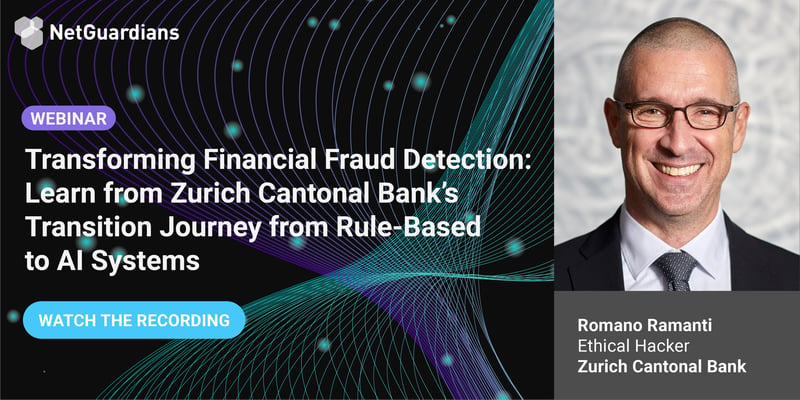In the digital age, where financial fraud schemes grow more sophisticated by the day, traditional rule-based systems are struggling to keep pace. The recent webinar hosted by NetGuardians, featuring insights from Romano Ramanti, an Ethical Hacker at Zurich Cantonal Bank (ZKB), shed light on a transformative journey towards AI-driven fraud detection. Here’s what we learned.
 |
|
ROMANO RAMANTI Romano Ramanti is a certified Ethical Hacker. He has been employed at Zurich Cantonal Bank (ZKB) since 2002. He has received his ethical hacker training in 2011. In 2015, Romano has established the eChannel Security department at ZKB. Since then, he has been working as an Ethical Hacker (malware analysis, threat intelligence, fraud detection). He is the also the application responsible of the Fraud Detection System at the bank. |
From Rules to AI: A Necessary Evolution
ZKB's journey began in the face of rising challenges. Their traditional fraud filter, a rule-based system embedded in their core banking solution, showed signs of strain. The revelation? Social engineering, a prevalent method in fraud, was evolving too rapidly for static rules to catch and the bank needed a more efficient and effective solution.
The Power of Anomaly Detection
Enter AI and machine learning, with their promise of dynamic, intelligent anomaly detection. Unlike rule-based systems that rely on predefined parameters, AI-driven solutions learn from data, continually improving their ability to identify unusual patterns indicative of fraud.
ZKB’s pivotal moment came with a proof of concept (POC) conducted with NetGuardians. The bank fed 70 million transactions into NetGuardians' AI system and hid 28 fraud cases. The system discovered not only all 28 hidden fraud cases, but an additional four new fraud cases. This success underlined AI's superior detection capabilities.
Implementation in Three Months and Results
The webinar detailed ZKB’s strategic plan to integrate NetGuardians’ AI-driven fraud detection system within an ambitious three-month timeframe. This rapid deployment was a testament to the commitment of ZKB and NetGuardians to combat fraud more effectively.
Upon transitioning, ZKB saw a significant shift. Comparing figures from April 2021 (using the old system) to March 2024, the bank witnessed a drastic reduction in daily hits (from 800-900 to 446) while increasing the fraud cases detected from 0 to 139. This improvement showcased the efficiency and accuracy of the AI system in filtering and identifying genuine threats.
The Final Setup: A New Era of Fraud Detection
In its final form, ZKB’s fraud detection system is augmented by robust AI risk models that can identify unusual transactions across various profiles. These models, combined with the ability to easily build and deploy rules, mark a significant leap forward in fraud detection.
Looking Ahead
The webinar concluded with a live demo by Thomas Heegaard, Presales Consultant at NetGuardians, offering a practical look at the system in action. The session ended with an open and highly interactive Q&A, inviting further discussion on this pivotal transition to AI-driven fraud detection.
ZKB's journey from conventional to AI-driven fraud detection not only sets a benchmark for the industry but also highlights the tangible benefits of embracing AI: enhanced detection capabilities, improved efficiency, and a proactive stance against the ever-evolving landscape of financial fraud.
For organizations considering a similar path, ZKB’s story serves as a powerful case study in the transformative potential of AI and machine learning in the fight against fraud.
You can watch this webinar recording and learn directly from ZKB’s Romano Ramanti.
More information needed?
If you would like to learn more, we're here to organize a call with you.
You can pick a date and time at your convenience for a personal meeting with one of our experts here.




